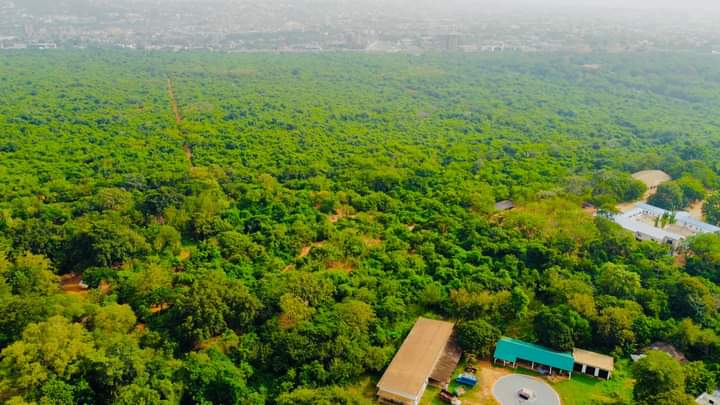Climate Change & Energy
MP blows alarm over demarcation of Achimota forest to private developers
Source: Ghenvironment.com - July 22, 2024

The Achimota Forest
The Member of Parliament for Tamale North, Alhassan Suyuhini, today, July 22, 2024, blew the alarm over a secret demarcation of the portions of the Achimota Forest Reserve in Accra.
According to the MP, it was some officials of the Forestry Commission and the Lands Commission, that led the demarcation exercise to allocate portions of the forest to private developers.
He wrote “Ongoing Now! Forestry Commission and LC at the Achimota Forest Demarcating portions of the Reserve for allocation to private developers. #StateCaptureMustEnd”.
If readers would recall, the Environmental group, Eco-Conscious Citizens on Wednesday, July 17 revealed in a press statement that, about 220 acres of Achimota Forest reserve are about to be parcelled out for development to increase the concrete jungle in the capital city.
The group in a statement was surprised that, despite public protests, there is a concerted effort to transfer this national asset into private hands.
“We cannot purport to Green Ghana when the cameras are on, and then proceed to remove hectares of forest from Achimota Forest reserve, the last remaining Forest Reserve in Accra”, a statement by the Eco-Conscious Citizens said.
The statement noted that, at a time when Ghanaians are complaining about the adverse effects of climate change due to the diminishing tree cover in Accra, what is needed is more green spaces, not less.
Another case of create, loot, and share?
Writing on the allocation of the portions of the forest for private development on his Facebook page, Deputy Director of A Rocha Ghana, Daryl Bosu asked whether it is another case of create, loot and share.
“The #Achimotaforest saga, another case of corruption, create, loot and share or what? Managed as an urban green space for many years and then like magic, portions are rezoned. We need some answers”, he wrote.
Eco-Conscious Citizens also raised the alarm on its X page “They are on the ground in Achimota Forest surveying (carving up?) the land to hive off for private development!”.
E.I. 144*
In establishing E.I. (Executive Instrument) 144 in 2022, the government declassified 361 acres of the forest and claimed to have handed this section over to its long-running overseers, the Owoo family, from whom the existing reserve land had been purchased in the 1920s. It must be noted that, the Osu stool is also claiming ownership of the forest.
The 1927 transaction of selling part of these lands to the government does not include any receipt of payment. In the 21st century, for more than a decade, the Owoo family has engaged in legal discourse with the Ghanaian government for the return of a portion of the land that the family felt the government was not using properly.
With the case in court, many people wondered what informed the decision by government to hand over portions of the forest to the owners. But, for some onlookers, the uncertainty of Achimota’s future threatens Accra’s economic stability and enduring biodiversity.
In Defense of Achimota Forest
“The 495 [hectare]Achimota Forest Reserve, created in 1930,” wrote GhanaWeb columnist Philip Kyeremanteng, “has over the years lost more than 150 [hectares]because of urban infrastructure development and illegal encroachment.”
The columnist proceeds to list potential benefits the Achimota Forest Reserve offers locals. Kyeremanteng notes that, like other forests, Achimota contributes to greenhouse gas elimination. Not only does it trap several such gases but the ongoing photosynthesis carried out by the hundreds of acres of woodland helps reduce carbon dioxide and produce oxygen. Furthermore, the forested reserve can help to stabilize climate conditions, the columnist contends.
“In urban settings like Achimota, for instance, the presence of trees can reduce the dependence on air conditioners,” Kyeremanteng said. Indeed, trees are large, long-lived plants capable of taking in carbon monoxide, one of the greenhouse gases that has contributed to increasing temperatures. Ghana itself, according to 2018 stats, produced 44,500.00 metric kilotons of greenhouse gases.
Extreme weather events, in turn, trickles down to affect impoverished communities. Inclement weather can destroy crops and entire livelihoods. When extreme weather patterns ruin the crops of the impoverished, communities lose their income and food security.
As far as economic benefits go, Achimota Forest is also a successful tourist attraction. If the woodland were to undergo development for urbanization, it would not only cut out a chunk of revenue rather quickly but would also have long-lasting and damaging aftereffects.
Awula Serwah
July 23, 2024
Winifred Amma Baffour
July 23, 2024
Rod Chapman
July 23, 2024
Patrick Japheth Danso
July 23, 2024
Harriet Omolola Sawyerr
July 23, 2024
Sister Nana
July 26, 2024
 The Achimota Forest
The Achimota Forest



Awula Serwah
July 23, 2024